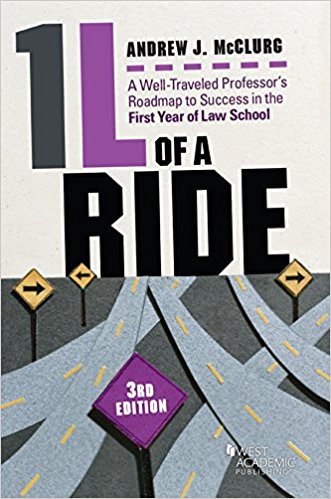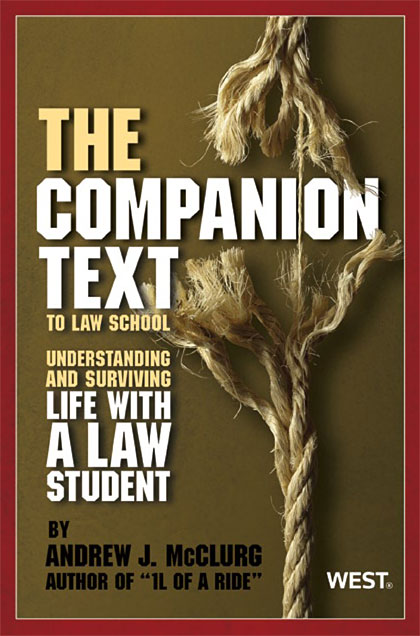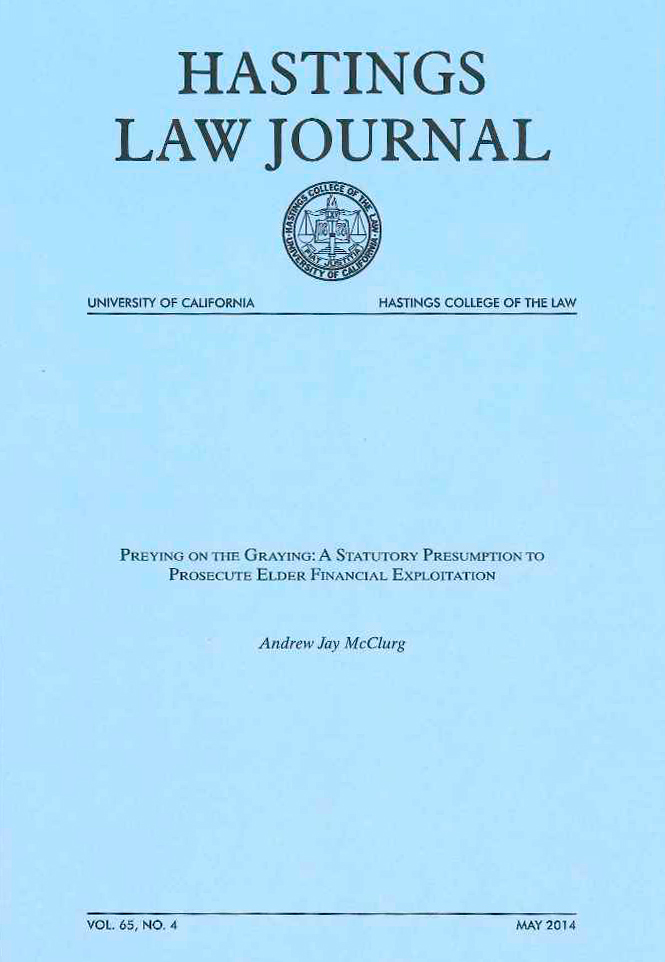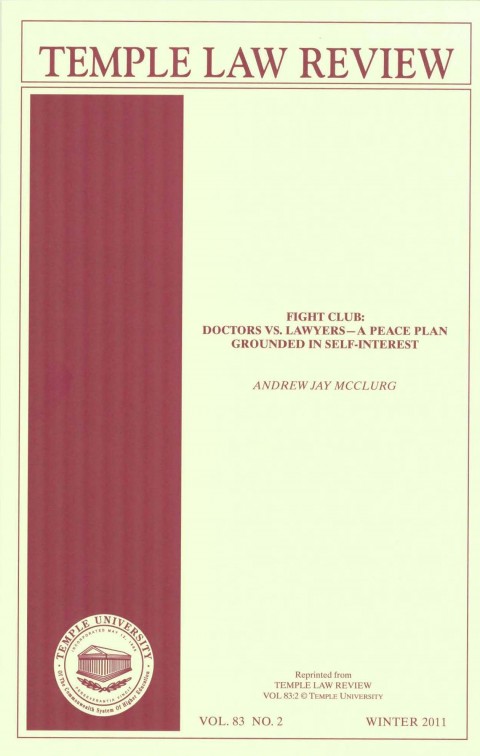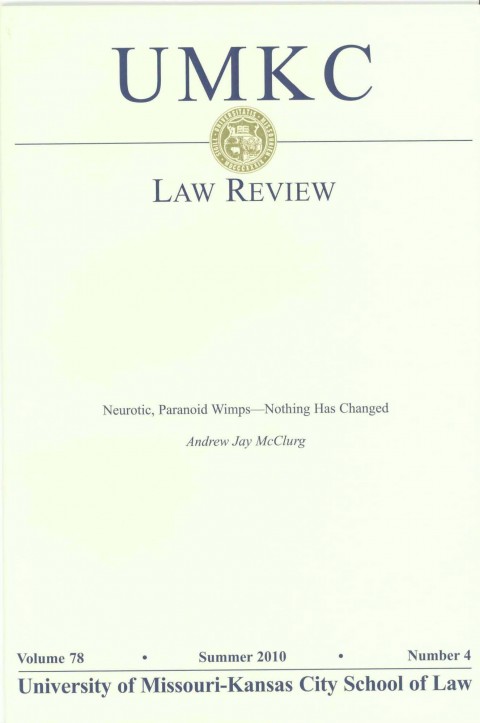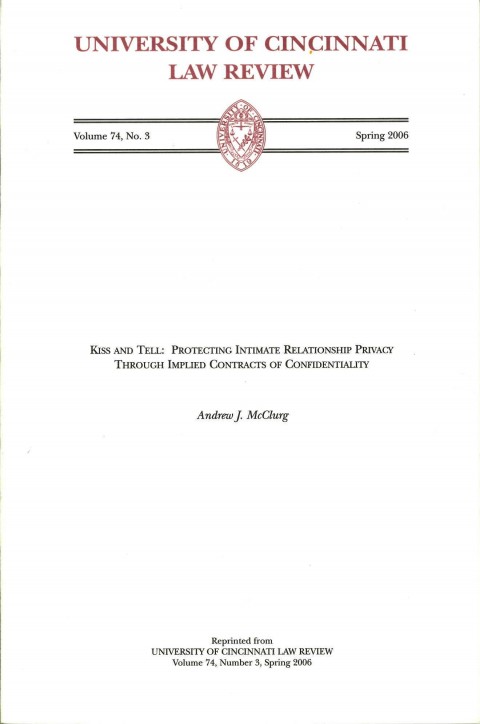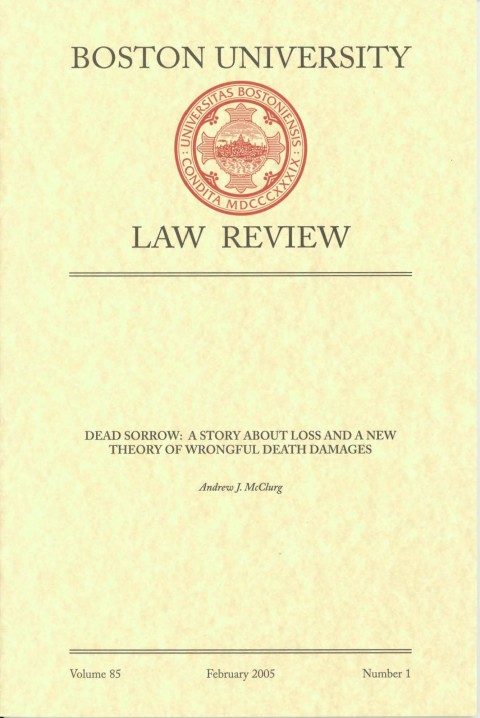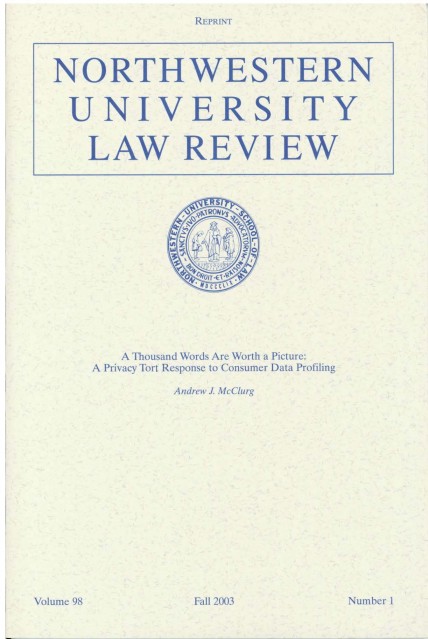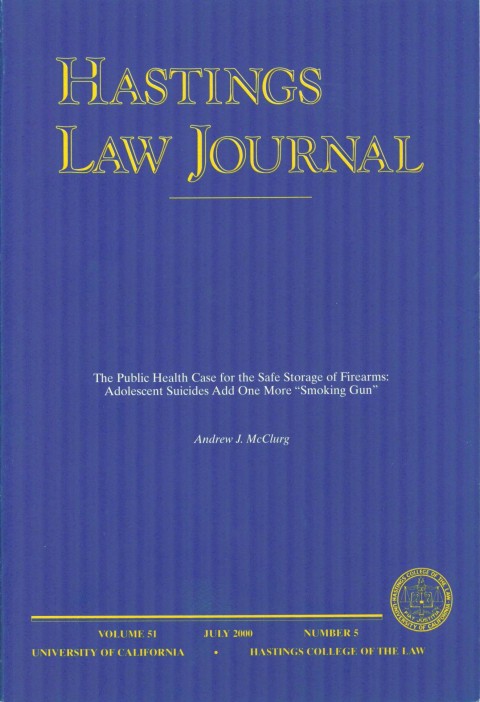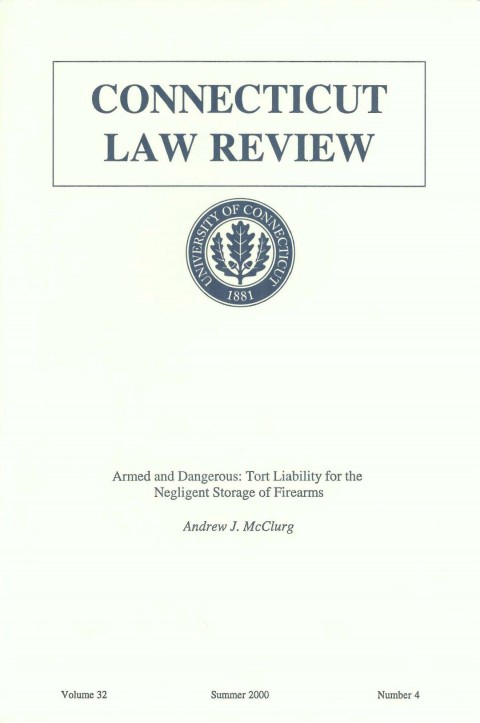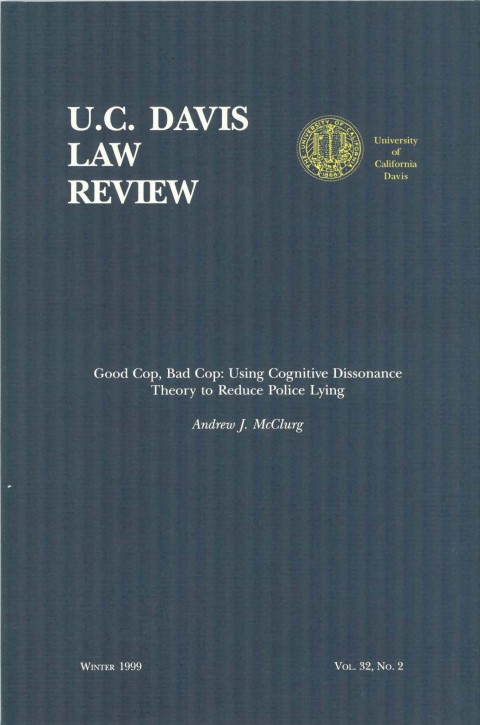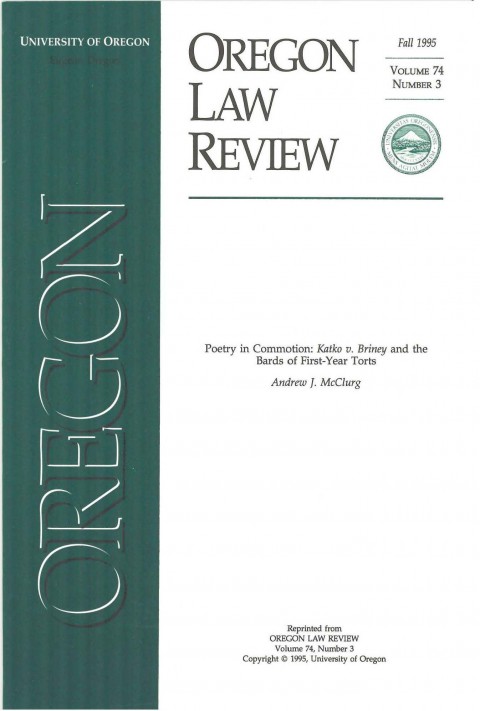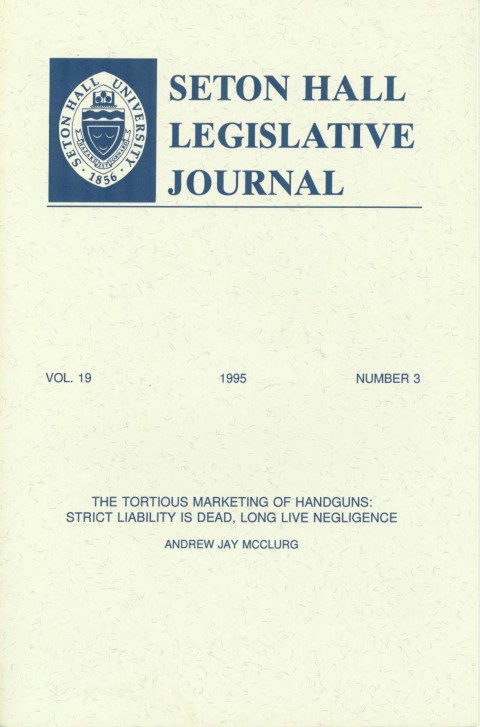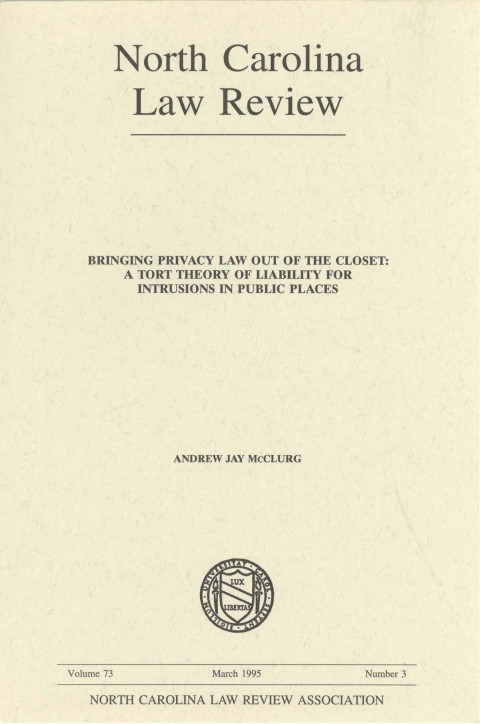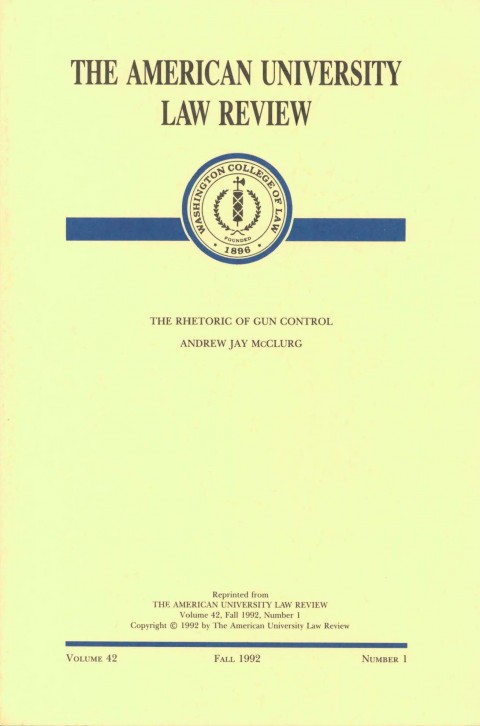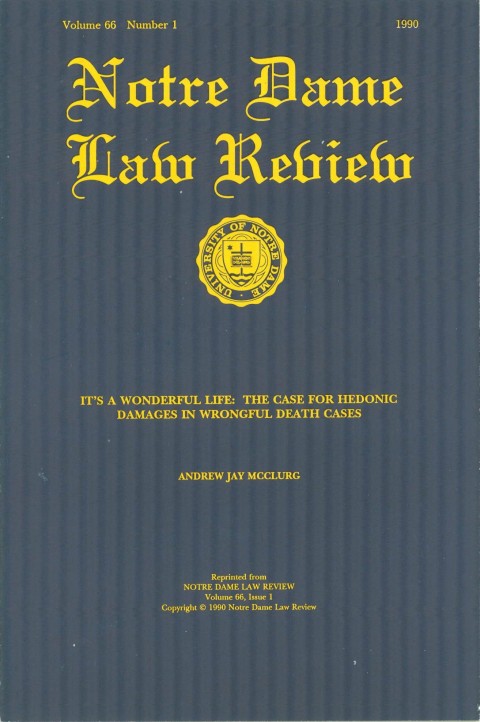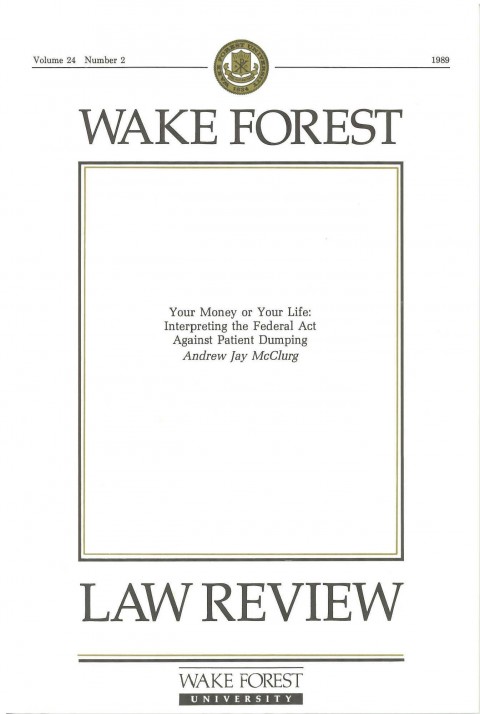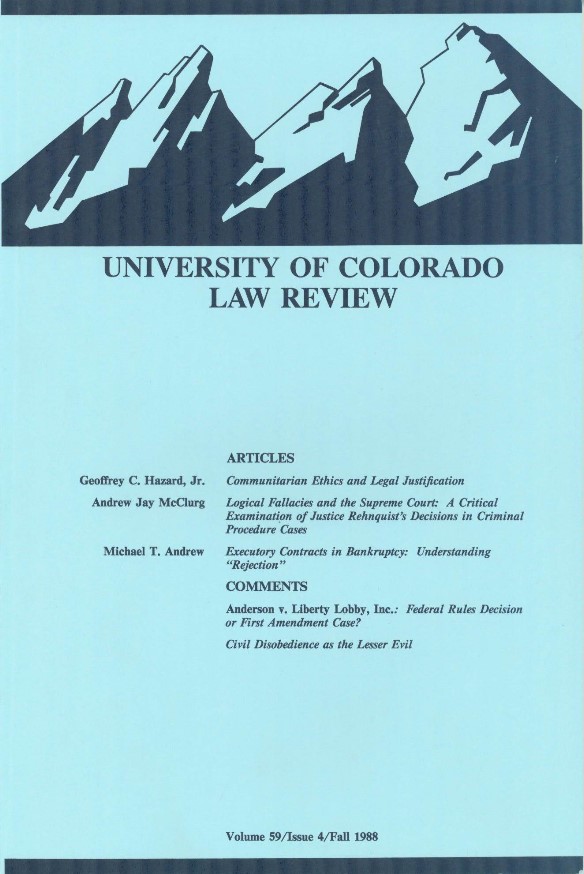July 29th, 2017 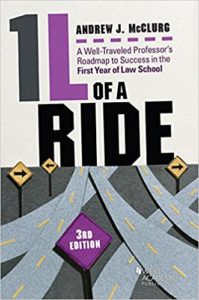
When new students arrive at law school, they receive a ton of advice from upper-level students. 2Ls and 3Ls love giving advice to new students. If they can do it at an event where alcohol is being consumed, a state close to nirvana is achieved. But how do incoming students distinguish between good advice and bad advice? Here’s a tip I give in 1L of a Ride. After mentioning that upper-level students sometimes give really good advice, I say:
But upper-level students also give some really bad advice, much of which involves ways to cut corners, so be wary of what they tell you. Although it will be socially awkward, if an upper-level student starts piling on the shortcut advice, ask the person about his or her GPA or class rank. You could phrase it like this: “Thanks for all the advice. Did it work for you?”
Last week I received an email from an incoming student at another law school. She complimented the book and added a funny postscript referencing the above passage:
P.S. Since your interest in humor is apparent, let me tell you a story from the second day of reading your book. I was with my parents before dinner and discussing the tips involved in your book. My father is a practicing lawyer who went to Ole Miss Law School and graduated in 1961. I haven’t considered him much of a resource due to the changed role of technology in that intervening period.
I mentioned two conversations I’ve had with friends who are already in law programs across the country and clarified that they gave excellent advice. I repeated your recommendation that you ask any student giving bad advice or shortcuts about their GPA to help evaluate its validity.
Some time later my dad started a sentence, “What you need to know about law school is …” When he finished I said, “Hey dad, that sounds like that really worked for you! May I ask what your GPA was?”
I’ll be listening to his fatherly advice, despite his C+/B- grade point average. 🙂 He’s more convinced than ever that repeating “You’ll go to law school and become a lawyer” beginning at the cradle was a good idea.
Love it. Seriously, folks, I was just looking at a law school page where an incoming student was asking for advice on a specific topic. The best answers came from the top students. Most people will make it through law school. If your goal is higher than that, carefully sift through all advice, from students, professors and, yes, even dads.
March 14th, 2017 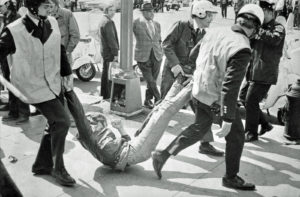 Just as doctors need patients, lawyers need clients. One can surmise that local criminal defense lawyers got plenty of business during the largest mass arrest in U.S. history. How many people were arrested and where did it occur? Just as doctors need patients, lawyers need clients. One can surmise that local criminal defense lawyers got plenty of business during the largest mass arrest in U.S. history. How many people were arrested and where did it occur?
- 140 in Peoria, Illinois
- 1500 in Boston, Massachusetts
- 12,000 in Washington, D.C.
- 17,500 in Los Angeles, California
ANSWER: In May 1971, more than 500,000 anti-Vietnam War protesters descended on Washington, D.C. with the intention of shutting down the federal government by blocking the streets. As of that date, 45,000 American soldiers had died in Vietnam and more than 250,000 troops were still stationed there. At least 12,000 protesters were arrested from May 3 through May 5, including Daniel Ellsberg.
Ellsberg, a former Defense Department analyst, had helped compile a report on the history of U.S. involvement in Vietnam from 1945–68 for Defense Secretary Robert McNamara. The study, which became known as the “Pentagon Papers,” exposed controversial, previously hidden truths about the scope and purpose of U.S. participation in the Vietnam War. Ellsberg leaked the Pentagon Papers to the New York Times, which began publishing them in installments.
The Nixon administration sued for an injunction, which resulted in a landmark U.S. Supreme Court case, New York Times Co. v. United States, 403 U.S. 713 (1971), where the Court ruled in favor of the newspaper by a 6-3 vote, a major victory in troubled times for the First Amendment right to free speech and a free press. Publication of the Pentagon Papers helped turn the tide of public opinion against the war. It took until June 2011, forty years to the day from the original publication of the Pentagon Papers by the New York Times, before the U.S. government officially declassified and released the papers.
The answer, therefore, is C.
May 7th, 2013 –From Tony Arsenault, Laval University (Quebec), Date of event: Spring 2013
One of my friends took Legal Philosophy, a class whose teacher is known as a bit of a jerk and a little dismissive of lawyering as a profession.
They were discussing how to write the essay that was to be their final exam. Someone in the class asked: “Should we consider that the essay’s intended readers have any knowledge of law at all?”
The teacher said that they should write the essay as if a member of the Bar would read it.
The student drew a logical conclusion and asked if that meant the exam-takers should assume the readers were knowledgeable about law.
The teacher answered: “No. You should write as if your audience doesn’t know anything about law, doesn’t care about law and is probably intoxicated on various substances to boot.”
December 4th, 2011 –From David Barman, Florida International University College of Law, Date of event: circa 2005
My son saw my first-year law school casebooks and picked up my Torts book. His first comment was: “Twelve hundred pages. That’s more than Harry Potter!”
Then he asked me, “What is Torts?” He’s a bright boy, but he is only nine. I asked him: “If you park your bike on the sidewalk, and a man hits your bike with a car, who did something wrong?” He said the man with the car. I asked why. My son answered “Because I’m allowed to put my bike on the sidewalk, but he isn’t allowed to drive on the sidewalk.” I said “Correct.”
Then I asked him: “Does the man in the car have to pay for the bike?” My son said yes. Then I said, “What if you get off your bike on the street and you leave it there just for a minute, and a man in a car hits it?” My son said, “It’s my fault.” I asked why, and he said, “Because I shouldn’t have left it in the street.”
Then I asked him if the man in the car has to pay for the bike. My son answered, “No.” I asked him why and he repeated, “Because I shouldn’t have left it in the street.”
I told him good job, that’s what Torts is. He said, “Is that it?” I told him “Yes.” Then he looked real confused and said, “Then why does the book have twelve hundred pages?”
October 26th, 2011 –From Michael Severe, Barry University School of Law, Date of event: 2010
During a summer class in Advanced Appellate Advocacy, the eleven us who were enrolled were sitting there listening to another riveting lecture on TREAC vs. IRAC when out of the blue one of our classmates thrust both his fists into the air, pumped them up and down like he just scored the winning touchdown in the Superbowl, and hollered “YES!” As you can imagine, the rest of us were slightly bewildered, the professor included. She looked at him and haltingly asked, “Is… there… a problem?” to which he responded “Oh sorry. I’m watching the World Cup and my team just scored.”
On one hand, I give the gentleman credit. There was not even an attempt to hide the truth, although, after his display, coming up with an explanation such as “I love this TREAC stuff!” would only have insulted our intellects.
After being kindly asked by the professor to leave, he demurred, and promised to be quiet. Rather than stage a scene, and disrupt class even further, our Professor went back to her lecture. I give her credit as I’m fairly sure you would have needed to peel me off the ceiling, if I’d been in her shoes. Not surprisingly, when grades were released, there were 10 As/B+s/Bs and … 1 F. No way to know the cause, but the soccer outburst couldn’t have helped.
October 26th, 2011 –From Jim Pikl, Gonzaga University School of Law, Date of event: Fall 1982
When we arrived for the first day of Orientation, we got a talk from a third-year. He told us a story about when he was a first-year in which he asked a third-year student: “Can you tell me where the library is at?” The third year rudely and pompously answered: “We here at Gonzaga do not end sentences in prepositions.” So the first-year rephrased the question: “OK, can you tell where the library is at, a******?”
October 26th, 2011 –From Erik Reverón, Florida A&M College of Law, Date of event: Fall 2006
So what does one wear under the kilt? Sometimes the lack of humour in a law school environment surprises me. Taking it upon myself as the good 1L student that I am to liven up the atmosphere, I wore my kilt around the hallowed halls of the law school.
I’m called upon in Contracts, and I stand up and give a dutiful response regarding unconscionability with all sub-elements. Silence ensues.
My professor then asks me in a completely normal voice: “So what is worn under the kilt?”
Hilarity ensues, and I respond: “Everything is in good working order this morning when I checked, Sir.” It got me a laugh, but also earned me the unrelenting attention of the rest of my professors that day.
Now every Friday, they check to make sure I’m wearing my kilt for class!
October 26th, 2011 –From Charles Hillestad, University of Michigan Law School, Date of event: circa 1972
Back in law school, I lived in the “LAWYERS CLUB,” a dorm reserved for law students in part of the Quadrangle comprising the University of Michigan law school buildings. One of my roommates decided he needed to cash in one of his bonds and contacted the stock brokerage company back east which handled his assets. He showed me the envelope containing the check when it arrived. It was addressed to him with just his name and the words, “LIARS CLUB, Ann Arbor, Michigan.”
The most startling part was not that the brokerage company managed to screw up the address, but the post office’s apparent opinion of the legal profession in deciding it still knew the right place to deliver it.
October 26th, 2011 –From Jennifer Simons, University of Houston Law Center, Date of event: Fall 2003
Here’s one of the funniest law school moments I’ve had so far. It happened at University of Houston Law Center in the Fall of 2003.
Professor Doug Moll is one of our best professors. He makes even the driest of subjects interesting, and the entire class pretty much hangs on every word.
“Sale” versus “service” under Article 2 under the UCC was the topic of the day and breast implants were the vehicle for discussing it. For at least thirty minutes, we discussed and debated whether breast implants were a good or a service. Every possible argument on each side had been made and exhausted, when Professor Moll finally asked if there were any questions before we moved on.
From the middle of the classroom, a hand emerged. When called upon, the student pressed his fingers together – like a steeple – and pressed them to the bottom of his chin. In that pompous I’m-really-going-to-stump-the-professor-with-this-question tone with which we’re all too familiar, he asked, “What about … breast implants?”
Apparently, he had been so enthralled in his own thoughts after the word “breast” had first been uttered a half hour earlier, he completely tuned out the next thirty minutes of discussion. Amazingly, no one laughed until class let out. But boy did we crack up then.
October 26th, 2011 –From Heather Antonsen, Dalhousie University Schulich School of Law (Nova Scotia), Date of event: September 2002
I was just entering my third year and my son was only three weeks old. We attended class together. In a final desperate act, I plugged in a baby monitor behind the professors so my son and I could sit outside the class and listen to the lectures. It was on one of these days that Professor Deturbide, a truly gifted tax law professor, was gently easing us into the intricacies of the Canadian Income Tax Act. Professor Deturbide made a quip about marginal tax rates. Amazingly, and exactly on cue, my new born Aleks woke up, giggled and promptly went back to sleep.
Amazed but slighted disturbed that my son’s first real laugh was in response to tax humor, I went up on break and recounted the event to our Administrations officer. She responded with, “I imagine that they were probably the only two in a class of sixty who were laughing.”
With that, Professor Deturbide popped around the corner and announced, with a hint of indignation, that his marginal tax rate line just so happens to be one of his better jokes!
October 26th, 2011 –From Heather Antonsen, Dalhousie University Schulich School of Law (Nova Scotia), Date of event: September 2002
Babies and law school made strange bedfellows. As I mentioned in the other story I submitted, my newborn son and I attended my third year of law school together. For the entire eight months, Aleks was breast-fed; hence, why we attended school together. One day, I was seated with Aleks on a bank of couches outside my tax class. Aleks was getting rather peckish but I was waiting for a rather stiff classmate of mine to move along so I could feed him. Unfazed by my comments about how hungry Aleks was, he continued to read his newspaper.
I finally gave up and discretely brought Aleks up to feed. Now before the public-feeding cries of protest fill the air, there was really no way to notice that Aleks was having his lunch… well, except for the sound effects. Within moments, my son was making “mmmmm” noises with the greatest of sincerity. I was mortified but for obvious reasons was unable to either move elsewhere nor did I have the heart to interrupt his lunch.
When Aleks’ compliments to the chef became rather loud, I tried to unlatch him so we could move. Not unpredictably, he let out a wail of despair. Without even looking up from his newspaper, my classmate said, “My sentiments exactly.”
October 26th, 2011 –From Janet Rae Montgomery, Stanford Law School, Date of event: 1976
At Stanford, the law school was on the semester system, while the rest of the university ran on a quarter system. That meant that our finals periods did not coincide with those of the undergraduates.
MemLib, the undergraduate library, was always loud, but during finals it was a madhouse. Many undergraduates seeking peace in which to study were invading our law library. We had barely enough cubicles in the library to satisfy the law student demand, and the undergrads were messing up our study cubicles—moving our books and notes, etc.
Those cubicles were, after all, our “offices” on the school premises, so we complained and a student “guard” was placed at the entrance to the library. No undergraduates were to be allowed into the library unless they were studying a law-related subject.
One day the guard on duty was a 2L. A very attractive and skimpily dressed undergraduate padded barefoot into the library and started to breeze right by him.
“Wait a minute,” the guard said. “Are you an undergraduate?”
“Yes, why?”
“Well, undergraduates are not allowed in the law library.”
“What?! But I have a big exam tomorrow and this is the only quiet place I can find.”
“Sorry, but I can’t let you in.”
Pouting, and also trying to flirt with the guy, she asked, “Isn’t there some way you can bend the rules?”
He looked over to where three woman law students were watching the exchange, and decided he had better disappoint her.
“No, I’m sorry,” he said. “I can’t let you in unless you’re here to study law.”
She brightened. “Oh, I’ve come to study the law of gravity.”
She got in.
October 26th, 2011 –From David Barman, Florida International University College of Law, Date of event: Fall 2002
I was studying in the Law Library one night and the place was virtually deserted. A young attractive undergrad came over and said hi and asked what I was studying. “Contracts,” I replied.
“Oh! You’re a law student!?” She said all excited. I tried to be polite and just answered “yes.”
She tried several times to start a conversation and I tried as nicely as possible to get her to leave me to my study. She then asked “Do you have a girlfriend?” I said “No.”
She asked “Why not?”
Final answer: “Because my wife won’t let me have one!” With that she said “Bye,” and left.
October 26th, 2011 –From George Carder, University of Arkansas at Little Rock School of Law, Date of event: March 2003
The week before last (two days before Spring Break) I was talking with my mother by cell phone as I was driving to class. I told her that I was on my way to Con Law. I said that I am working very hard on Con Law because it does not come easy to me.
She reassured me as only a mother can when she said, “Don’t worry, Honey. Today, you will know as much about the topic as anyone in your class.”
I responded, “Thank you, Mother. Today’s topic is ‘Obscenity and Pornography.'”
October 26th, 2011 –From Julie Enloe, Marquette University Law School, Date of event: 1992
Like myself, my best friend during law school was a non-traditional student. However, she was much older than me and quite proud of the fact that she was a card-carrying member of the AARP.
During evidence class, we got into a discussion of “the ideal witness.” The professor posed some hypothetical examples, including a police officer who, at 55, was near retirement, as opposed to his much younger and rather inexperienced partner.
One young man in the second row was quite disgusted by the notion of an older witness. Such a person, he opined, could be easily cast as incompetent. “After all,” he said, “he’s going to die soon!”
No one laughed harder than my friend, who remarked that it was nice to know that she would graduate with one foot already in the grave.
(By the way, my friend is still very much alive and runs her own law practice!)
October 26th, 2011 –From Jeremy Zeitlin, Columbia Law School, Date of event: 1984
Here’s a law school moment I’ll never forget: Columbia University, 1984 … It was a lecture conducted by some hot-shot VIP who refused to answer any questions following his hour-long rant on the politics of malpractice suits.
A woman in the back says, “Please sir, just answer my one, two-part question please?” So, thinking he was being very clever, the speaker says, “Okay, give me the second question first.”
A few chuckles followed, at which point the fast-thinking woman said, “If so, when?” Naturally, the place fell apart and she received an ovation.
October 26th, 2011 –From Sylvia J. Feinman, Brooklyn Law School, Date of event: circa 1977.
We were in Domestic Relations class, focusing on annulment and the question of who can bring an action to annul a marriage. The problems became more and more esoteric. Who can bring an action to annul the marriage of a deceased person? Of an incompetent? Then one eager student went too far in his querying.
I closed my books decisively and said, “If I ever need to know who can bring an action to annul the marriage of a dead idiot, I’ll look it up.”
October 25th, 2011 –From Carol Light, American University School of Law, Date of event: early 1970s
I went to night law school at American University in Washington, D.C. in the early 1970s. Our class was full of interesting people with demanding full-time jobs, so it’s not surprising that one of the, er, challenges, was literally staying awake in class. One night (and I’ve blessedly forgotten which class, which professor, and which student), one poor young man lost the battle, fell both asleep and off his chair onto the floor. The fall woke him, of course.
The professor, not missing a beat, said “Well, Mr. X, are we keeping you up?”
“Just barely,” the student replied, with alacrity and admirable accuracy.
October 25th, 2011 –From name withheld by request, Loyola University (Chicago) School of Law, Date of event: circa 1991
I went to night school at Loyola University of Chicago School of Law and graduated in 1991. In my last year of law school, I took the intensive week-long Trial Advocacy class. For one practice exercise, we had to be videotaped making an argument to have a piece of evidence admitted over an objection and we had to dress as if we were in court. Since we were all just law students without jobs, some people had to purchase suits specifically for the exercise.
A woman, whose name I can’t remember, got up to give her argument, and it was impossible not to notice that she still had the anti-theft, “inventory control” tag attached prominently to the side of her suit jacket. She was extremely embarrassed and obviously concerned that everyone watching was going to think that she had stolen her suit, so she spent several minutes at the beginning of her argument explaining that the tag had been left on by the store and she didn’t discover it until she got home after the store had closed, etc.
Then she went into her actual argument, which didn’t last nearly as long as the tag explanation.
|
Funny Law School Stories
For all its terror and tedium, law school can be a hilarious place. Everyone has a funny law school story. What’s your story?
|
Product Warning Labels
A variety of warning labels, some good, some silly and some just really odd. If you come encounter a funny or interesting product warning label, please send it along.
|
Tortland

Tortland collects interesting tort cases, warning labels, and photos of potential torts. Raise risk awareness. Play "Spot the Tort." |
Weird Patents
Think it’s really hard to get a patent? Think again.
|
Legal Oddities
From the simply curious to the downright bizarre, a collection of amusing law-related artifacts.
|
Spot the Tort
Have fun and make the world a safer place. Send in pictures of dangerous conditions you stumble upon (figuratively only, we hope) out there in Tortland.
|
Legal Education
Collecting any and all amusing tidbits related to legal education.
|
Harmless Error
McClurg's twisted legal humor column ran for more than four years
in the American Bar Association Journal.
|
|
|




